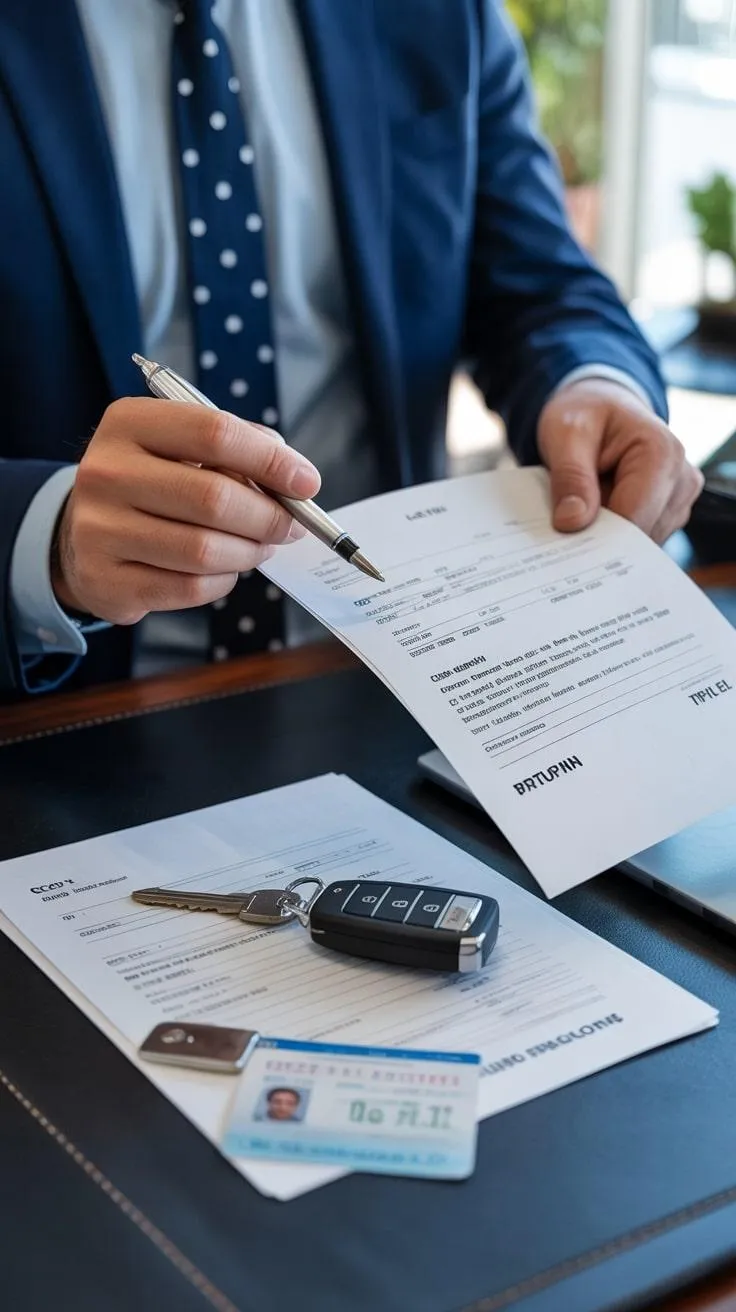
10 Easy Ways to Avoid Car Title Trouble at the DMV
Imagine waiting hours at the DMV, only to learn your vehicle title has an error that sends you back home. Studies show nearly 20% of vehicle owners face delays or rejections due to title issues. This turns simple transactions into costly frustrations.
Whether you’re buying a used sedan, selling a motorcycle, or registering an RV, mistakes like missing signatures, incorrect or mismatched VINs, or unresolved liens can derail your plans. They complicate the title for the vehicle.
These problems hit harder for owners of specialty vehicles, such as off-road UTVs or classic cars, due to complex state rules regarding the DMV office.
This guide offers 10 practical tips to help you sidestep complications related to getting the title signed. Avoid car title trouble. It saves time, money, and stress when navigating the department of motor vehicles.
Ensure You Receive a Title When Buying
Always confirm you receive a valid title when purchasing a vehicle, whether it’s a car, truck, RV, or specialty vehicle like a Kei truck. The title proves legal ownership. Without it, you risk fraud, disputes, or registration delays when trying to sell a car. Before paying, check that the title lists the seller’s name, matches the vehicle’s VIN, and shows no liens (debts owed to a lender) to ensure you receive a clear title.
A client in Ohio bought a used ATV without a title and spent four months gathering proof of ownership. This delayed their trail rides. If the seller lacks a title, you’ll need vehicle title recovery through the DMV. This requires the correct mileage, VIN and ownership documents. It often takes weeks.
To prevent issues, verify the title’s authenticity. Run a VIN check via the National Insurance Crime Bureau (NICB). Request a bill of sale to avoid title problems. Low-priced vehicles without titles may signal theft or unpaid loans. Proceed cautiously to keep your purchase trouble-free.
For added protection, ask the seller about the vehicle’s history. Confirm lien status with the lender. If the title is missing for your used car, a professional service can streamline the recovery process. But verifying the title upfront saves the most hassle. This step ensures your ownership is secure and registration proceeds smoothly, regardless of the vehicle type. If discrepancies arise, seize our vital fixes for resolving car title VIN mismatch disasters to protect your deal.
Sign and Date the Title Properly
Correctly signing and dating the title during a sale prevents issues with the title that is signed. Failure to transfer title. Neglecting this step can lead to fines or legal issues regarding the car's title. Use blue or black ink. Ensure your signature matches your ID exactly. Both buyer and seller complete their sections, including the sale date, to get the title signed properly.
Title jumping, where a reseller skips signing, is illegal in most states and can result in penalties. It risks penalties. For example, a motorcycle seller in California faced a $3,000 fine after leaving a title unsigned. This caused disputes for the buyer. To avoid problems, confirm all signatures and dates before finalizing the sale. Some states require notarization. Check your DMV’s rules online or by phone.
If you’re selling, sign only after the deal is complete to prevent fraud. Buyers should verify the seller’s signature matches the title in your name before completing the sale. These precautions ensure the transfer is legally binding. They keep your transaction free of complications and delays at the DMV. For seamless handling, capture our proven steps in the motorcycle title transfer guide that eliminate guesswork.
Can You Cross Out a Mistake on a Car Title?
Can you cross out a mistake on a car title? No, altering or crossing out errors on a title typically invalidates it. This leads to DMV rejections. Titles are legal documents. Changes like correcting a misspelled name or wrong date require a duplicate title from the DMV to ensure the car's title is accurate.
A client in Georgia scratched out an incorrect sale price. This resulted in a six-week delay and a $75 fee for a replacement. To fix an error, submit the vehicle’s VIN, mileage, proof of ownership, and a fee (usually $10–$50) to your DMV to ensure you get a clear title.
Check your state’s website for specific forms, as requirements vary. For example, Texas allows online applications for a new car title. New York may require in-person visits. Avoid using correction fluid or scribbling. Verify all details before signing to prevent mistakes altogether.
If the title is damaged or illegible, request a duplicate immediately to avoid delays. For complex cases, such as titles with multiple owners, consulting the DMV or a professional ensures accuracy and compliance with state rules. To tackle mileage errors specifically, nab our essential corrections for repairing car title mileage flaws that rescue your paperwork.
File a Release of Liability Promptly
Filing a Release of Liability (ROL) after selling a vehicle protects you from future liabilities, such as tickets, accidents, or legal issues caused by the new owner. Most states require submission within 5–10 days. Often via an online form or a section on the title itself.
A classic car collector in Texas avoided a $2,000 parking fine by filing an ROL immediately after selling a vintage Mustang. The buyer failed to register it. The ROL includes the vehicle’s VIN, sale date, and buyer’s details. Many states, like California, allow online filing for a replacement title for convenience. Check your DMV’s website for deadlines and submission methods. Some require mail or in-person delivery of the title to the DMV.
Neglecting this step can leave you responsible for the vehicle’s actions, even after the sale. Especially if you don't get a clear title. Keep a copy of the ROL for your records. Confirm the DMV has processed it to ensure full protection from unexpected costs or legal disputes. For error-free sales, secure our practical repairs in mending car title errors when selling to shield your transaction.
Verify the VIN Across Documents
The Vehicle Identification Number (VIN), a 17-digit code on the vehicle’s dashboard or door frame, must match exactly on the title, bill of sale, and other documents. Mismatches can signal errors, fraud, or a stolen vehicle. This causes DMV rejections or legal trouble.
A Florida buyer avoided a scam by noticing a VIN discrepancy on a used ATV. A NICB check revealed it as stolen. Before buying, inspect the vehicle’s VIN and compare it to the title. Then run a VIN check through the NICB or Carfax to uncover accidents, salvage status, or theft records for the car's title. When selling, ensure the VIN is accurately recorded to avoid delays for the buyer. Confirm that the title belongs to you.
If a mismatch occurs, contact the DMV immediately to resolve it. Some errors stem from clerical mistakes. For specialty vehicles like military Humvees, VIN verification is especially critical due to unique documentation needs. This step ensures a secure, legal transfer across all vehicle types. When no VIN exists, lock in our key approaches for managing no VIN classic car challenges.
Understand State-Specific Requirements

DMV rules for title transfers differ across states. Missing a requirement can halt your process. California often mandates smog checks. Montana may waive emissions for certain vehicles. This makes it easier for buyers at the dealership. Other requirements include proof of residency (e.g., utility bills), a valid ID, or specific forms for inherited vehicles to sign the title properly.
A client in Arizona struggled with a Kei truck registration due to missing customs forms. This delayed their process by two months. It could have been avoided with the original title.
To avoid issues when trying to transfer a car title, visit your state’s DMV website or call ahead to confirm needs. Such as inspections, notarized signatures, or address updates. For example, Florida requires in-person VIN inspections for out-of-state vehicles. Texas allows online address changes.
Specialty vehicles, like off-road UTVs, face stricter rules in some states. But may qualify for exemptions elsewhere. This allows owners to avoid title problems. Montana’s lenient registration laws, for instance, bypass inspections for certain vehicles. Saving owners significant costs. Thorough research and preparation ensure your title transfer meets state standards. It prevents rejections and delays when buying a new car. To navigate anywhere, grasp our solid paths for classic car registration in any state.
Clear Liens Before Transfer
A lien indicates a lender, such as a bank, holds a claim on the vehicle until the loan is paid. The DMV won’t transfer a title without a lien release document. This confirms the debt is cleared. It allows you to obtain a clear title.
A New York RV owner faced an eight-week delay because their lender delayed providing a release after loan repayment. To avoid this, contact the lender early to verify the loan status. Request the release, which includes the VIN and payment confirmation for the title that is signed. If buying, check the title for lien notations. Ask the seller for the document before proceeding.
For complex cases, like liens from defunct banks, the local DMV or a professional service can assist in obtaining a new title. Unresolved or hidden liens block ownership transfers. Verify lien status early. This step ensures a clean title. It prevents costly setbacks for cars, motorcycles, or specialty vehicles like ATVs. Especially if the lien is on the title. To spot issues fast, claim our sharp alerts on detecting hidden liens on car title that save you from traps.
Where to Keep Your Car Title
Where to keep your car title? Store your title in a fireproof, waterproof safe at home or a bank’s safe deposit box. Not in your vehicle, where it risks theft or damage. A stolen title can allow a thief to sell your vehicle illegally. As happened to an Oregon motorcycle owner who lost their title in a glove box break-in. This led to a year-long legal fight.
Environmental factors, like heat or moisture, can also ruin titles. Making them illegible and potentially leading to a salvage title. Create a digital backup, such as a scanned copy stored securely online, for extra protection. Retrieve the title only for transactions like selling or registering. Avoid keeping it with frequently accessed documents like registration or insurance. Especially the back of the title.
Safe storage prevents loss and ensures quick access to your documents when needed. Including your lost title. For owners of RVs or classic cars, secure handling is especially vital due to the high value of these vehicles. If loss happens, snag our reliable recovery for reclaiming motorcycle title essentials.
Prepare All Paperwork in Advance
Incomplete paperwork is a leading cause of DMV rejections. It wastes hours in line. Gather all required documents before your visit: title, bill of sale, lien release, valid ID, and state-specific forms. Such as inheritance affidavits or power of attorney. A Colorado UTV owner was turned away for missing a bill of sale. This lost a day’s work.
Check your DMV’s website for a checklist. It may include proof of insurance, emissions test results, or residency verification. For specialty vehicles, like military Humvees, additional documents, such as customs forms, are often needed. Our online platform at Street Legal Hookup simplifies this by guiding you through document collection. Preparing thoroughly saves time and ensures a smooth title transfer.
Organize documents in advance. Verify signatures in order. Confirm requirements by calling the DMV or using online resources. This diligence prevents delays. Especially for complex registrations involving off-road vehicles or collectors’ cars. To clarify basics, pick up our straightforward outline of the distinctions between titling, tagging, and registering.
Handle Specialty Vehicles with Care
Titling specialty vehicles, such as military Humvees, Kei trucks, or off-road UTVs, involves unique challenges due to varied DMV rules. Imported vehicles require customs forms and EPA compliance. Off-road vehicles may need street-legal modifications to register a car properly and obtain a title to the DMV.
A Nevada client faced a three-month delay registering a military Humvee due to missing surplus documentation needed to get a title. Research your vehicle’s requirements through the DMV or consult an expert to avoid issues with the title to the DMV.
For example, Montana’s registration laws often bypass emissions and inspections. Saving owners $10,000 or more on specialty vehicles. We’ve helped clients register Kei trucks and convert UTVs to street-legal status. Streamlining complex processes.
Check state-specific rules for exemptions. As classic cars or off-road vehicles may qualify. Proper documentation, like VIN verification or modification records, ensures compliance. It prevents delays. Making titling straightforward for enthusiasts and collectors. For modified rides, grab our strategic outlooks on registering highly modified cars out of state.
Conclusion: Simplify Your Title Process
These 10 tips make navigating the DMV less stressful. Helping you avoid delays, fines, and legal issues. From securing a title at purchase to preparing paperwork thoroughly. Each step ensures a smooth process for cars, RVs, or specialty vehicles like Kei trucks.
Street Legal Hookup’s fully online platform simplifies titling and registration nationwide. Using Montana LLCs to save $5,000 to $15,000 and bypass inspections. Our team specializes in complex cases. Delivering permanent plates for your new car and peace of mind. Start your title process with us today for a seamless experience when you buy a car.
Frequently Asked Questions
What voids a car title?
A title becomes void if altered (e.g., crossed-out errors), lost, or replaced by a duplicate. It is crucial to ensure the odometer reading is accurate. Scribbling on a title or using an outdated original after a duplicate is issued leads to DMV rejections. Apply for a replacement title through the DMV with the VIN, mileage, and ownership proof to resolve issues quickly. Maintain a valid title for your new car.
How do you get around not having a title?
Without a title, apply for a replacement via the DMV using the VIN, mileage, and proof of ownership, like a bill of sale, to get the title signed. For complex cases, such as imported Kei trucks, professional services can simplify the process. Reducing delays and ensuring compliance with state regulations. Particularly when dealing with the original title.
What is Curbstoning?
Curbstoning occurs when unlicensed dealers sell vehicles without proper titles. This illegal practice leaves buyers with a car without a clear title and risks fines or legal disputes for those trying to transfer a car title without proper documentation. Verify the seller’s credentials and title authenticity to ensure a legal, trouble-free transfer.
Can I fix a title mistake?
Altering a title risks invalidating it. Especially if the title is known as floating a title. Request a replacement title from the DMV with corrected information. Using the VIN and ownership proof to resolve issues with a lost title for your used car. Professional services can expedite this for vehicles like motorcycles or RVs. Ensuring quick resolutions and compliance with obtaining a new vehicle title.
How do I title a Kei truck?
Imported Kei trucks need customs forms, VIN verification, and sometimes EPA compliance to ensure a smooth process when obtaining a new title. Montana’s lenient laws simplify registration. Often bypassing emissions tests. Check your DMV’s rules or consult experts for streamlined, cost-effective titling. Especially when you need a new title.
What if I lost my title?
Contact the DMV with the VIN, mileage, and proof of ownership to get a replacement. Typically for $10–$50. Professional services can handle this nationwide. Often within days. Especially for specialty vehicles like ATVs or classic cars. Ensuring the title belongs to the new owner.
Do specialty vehicles need inspections?
Many states require emissions or safety inspections. But Montana registrations often bypass these. Saving costs for those looking to register a car. Verify your state’s rules. As requirements differ for vehicles like military Humvees or off-road UTVs.



